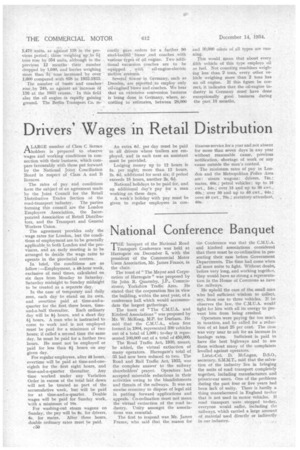National Conference Banquet
Page 104

If you've noticed an error in this article please click here to report it so we can fix it.
THE banquet of the National Road Transport Conference was held at Harrogate on December 5, with the president of the Commercial Motor Users Association, Mr. James France, in the chair.
The toast of "The Mayor and Corporation of Harrogate" was proposed by Sir John R. Quarmby, J.P., Commissioner, Yorkshire Traffic Area. He stated that the corporation has in view the building, within the next year, of a conference hall which would accommodate the largest gatherings.
The toast of "The C.M.U.A. and Rindred Associations" was proposed by Mr. W. McKeag, M.P. for Durham. He said that the C.M.U.A., when first formed in 1904, represented 300 vehicles out of a total of 1,000; to-day it represented 100,000 out of a total of 450,000.
The Road Traffic Act, 1930, meant, he added, the virtual extinction of many operators. Harrogate's total of 35 had now been reduced to two. The Road and Rail Traffic Act, 1933, was the complete answer to the railway shareholders' prayer. Operators had accepted miserable reductions in their activities owing to the blandishments and threats of the railways. It was an unwise economy to dispose of legal aid in putting forward applications and appeals. Co-ordination must not mean the virtual extinction of the road industry. Unity amongst the associations was essential.
The first to respond was Mr. James France, who said that the reason for the Conference was that the CM-V.A. and kindred associations considered that there must be co-ordination in presenting their case before Government Departments. The time had come when all must unite to fight. Without doubt, before very long, and working together, they would have as strong a representation in the House of Commons as have the railways.
He upheld the case of the small man v;ho had sufficient wisdom to collect, say, from one to three vehicles. If he observes the law, the C.M.1J.A. would tight for him with all its energy to prevent him from being crushed.
Operators were paying far too much in taxation, and he called for a reduction of at least 25 per cent. The time was very near to ask for an increase in haulage rates. Sufficient is paid to have the best highways and to use them without many of the complaints levelled against operators.
Lieut.-Col. D. McLagan, D.S.O., secretary, S.M.M.T., said that the salvation of the industry lies in bringing the units of road transport completely together, including manufacturers and private-car users. One of the problems during the past four or five years had been lack of unity. There is hardly a thing manufactured in England to-clay that is not used in motor Vehicles. If road transport were stopped to-day, everyone would suffer, including the railways, which carried a large amount of material used directly. or indirectly in our industry.




































































































































































